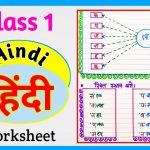Preparing an English worksheet for Class 4 involves a careful blend of reading, writing, grammar, vocabulary, and fun activities that are engaging and educational. Here’s a step-by-step guide to help you create an effective worksheet
Reading Comprehension
Reading comprehension is a critical skill that helps students understand and interpret texts. In this section, we provide passages followed by questions to test comprehension.
Passages and Questions
Passage 1: The Busy Squirrel
In a large forest, there lived a very busy squirrel named Sam. He spent his days gathering nuts and seeds to prepare for the winter. Sam was known to be the most diligent squirrel in the forest, always finding the best spots to store his food.
One day, Sam met a young squirrel named Tim. Tim was playful and loved to spend his time jumping from tree to tree. Sam decided to teach Tim the importance of hard work and preparation.
Questions:
- What was the name of the busy squirrel?
- What did Sam gather to prepare for winter?
- How was Sam different from Tim?
- What lesson did Sam want to teach Tim?
Passage 2: The Brave Little Dog
Lily was a little dog who lived with her family in a cozy house by the beach. One stormy night, Lily heard a strange noise outside. She bravely went out to investigate and found a lost kitten shivering in the rain. Lily brought the kitten inside and took care of it until the storm passed.
Questions:
- Where did Lily live?
- What did Lily hear on the stormy night?
- Who did Lily find outside?
- How did Lily help the kitten?
Grammar
Grammar is the backbone of any language. It helps in constructing meaningful sentences. This section covers parts of speech, tenses, and sentence structure.
Parts of Speech
Nouns: A noun is a person, place, thing, or idea. Examples: dog, school, happiness.
Verbs: A verb expresses an action or a state of being. Examples: run, jump, is.
Adjectives: An adjective describes a noun. Examples: happy, tall, blue.
Exercises:
- Identify the nouns in the following sentences:
- The cat is sleeping on the couch.
- She loves reading books.
- Underline the verbs in these sentences:
- They are playing in the park.
- He reads a book every night.
- Circle the adjectives in the sentences:
- The red ball bounced high.
- She wore a beautiful dress.
Tenses
Present Tense: Describes an action happening now. Examples: She eats, They play.
Past Tense: Describes an action that has already happened. Examples: She ate, They played.
Future Tense: Describes an action that will happen. Examples: She will eat, They will play.
Exercises:
- Convert the sentences to past tense:
- She runs fast.
- They enjoy the game.
- Change the sentences to future tense:
- He reads a book.
- We visit the museum.
Sentence Structure
A well-structured sentence contains a subject and a predicate. It must convey a complete thought.
Exercises:
- Rearrange the words to form correct sentences:
- is / the / beautiful / sky / blue.
- cake / she / baked / a / delicious.
Vocabulary
Expanding vocabulary is essential for effective communication. This section includes word lists, synonyms, and antonyms.
Word Lists
Common Words:
- Apple
- Dog
- Happy
Advanced Words:
- Delicious
- Curious
- Exciting
Exercises:
- Match the words with their meanings:
- Delicious: _____
- Curious: _____
- Exciting: _____
Synonyms and Antonyms
Synonyms: Words with similar meanings. Example: Happy – Joyful
Antonyms: Words with opposite meanings. Example: Hot – Cold
Exercises:
- Find synonyms for the following words:
- Quick: _____
- Smart: _____
- Find antonyms for these words:
- Big: _____
- Soft: _____
Writing Skills
Writing helps in expressing thoughts clearly. This section focuses on paragraph writing and story writing.
Paragraph Writing
A paragraph should have a topic sentence, supporting details, and a concluding sentence.
Example: Topic Sentence: My favorite hobby is reading. Supporting Details: I enjoy reading mystery novels. It helps me relax and learn new things. I visit the library every weekend to find new books. Concluding Sentence: Reading is a hobby that I will always love.
Exercises:
- Write a paragraph about your favorite animal.
- Describe a place you visited recently.
Story Writing
A good story has a beginning, middle, and end. It includes characters, a setting, and a plot.
Example: Title: The Lost Puppy Beginning: Once upon a time, there was a puppy named Max who loved to explore. Middle: One day, Max wandered too far from home and got lost. He met many animals who helped him find his way. End: Finally, Max found his way back home, and his family was overjoyed to see him.
Exercises:
- Write a story about a magical adventure.
- Create a story about a day in the life of a superhero.
Listening and Speaking
Listening and speaking skills are crucial for effective communication. This section includes activities and tips.
Activities
Listening Comprehension:
Listen to a short story and answer questions about it.
Example: Listen to the story of “The Tortoise and the Hare” and answer the following questions:
- Who were the main characters?
- What was the race about?
- How did the tortoise win?
Speaking Practice:
Practice introducing yourself.
Example: “Hello, my name is ____. I am ___ years old. My favorite hobby is ____. Nice to meet you!”
Fun with English
Learning English can be fun with puzzles and games. This section includes activities to make learning enjoyable.
Puzzles and Games
Crossword Puzzles:
Create a crossword puzzle using vocabulary words.
Word Searches:
Find the words hidden in the grid.
Scrabble:
Play Scrabble to improve vocabulary.
Assessment
Testing helps in assessing the understanding and progress of students. This section includes a sample test and an answer key.
Sample Test
Reading Comprehension:
Read the passage and answer the questions.
Grammar:
Identify the nouns and verbs in the sentences.
Convert sentences to different tenses.
Vocabulary:
Match synonyms and antonyms.
Writing:
Write a paragraph about your favorite season.
Create a short story.
Answer Key
Reading Comprehension:
Answer the questions based on the passage provided.
Grammar:
Nouns: cat, couch; Verbs: is sleeping
Past Tense: She ran fast. They enjoyed the game.
Future Tense: He will read a book. We will visit the museum.
Vocabulary:
Synonyms: Quick – Fast; Smart – Intelligent
Antonyms: Big – Small; Soft – Hard
Writing:
Sample answers based on student’s creativity.
Examples of english worksheet for class 4
Worksheet 1: Grammar – Nouns and Pronouns
Section A: Identify the Nouns
Underline the nouns in the following sentences:
- The cat is sleeping on the couch.
- John and Mary went to the park.
- My favorite book is on the table.
- The flowers in the garden are beautiful.
- She bought a new dress yesterday.
Section B: Replace the Nouns with Pronouns
Rewrite the sentences by replacing the underlined nouns with appropriate pronouns:
- Sarah gave Sarah’s book to Tom.
- The dog chased the dog’s tail.
- Peter and Jane went to Peter and Jane’s grandparents’ house.
- The teacher praised the students.
- The car lost the car’s way in the fog.
Worksheet 2: Vocabulary – Synonyms and Antonyms
Section A: Match the Synonyms
Match the words in Column A with their synonyms in Column B:
| Column A | Column B |
|---|---|
| 1. Happy | a. Tiny |
| 2. Big | b. Joyful |
| 3. Fast | c. Silent |
| 4. Small | d. Quick |
| 5. Quiet | e. Large |
Section B: Write the Antonyms
Write the antonyms of the following words:
- Hot
- Day
- Laugh
- Up
- Bright
Worksheet 3: Reading Comprehension
Read the passage and answer the questions that follow:
Passage: Sophie and her brother, Jack, went to the beach last weekend. They built a huge sandcastle and collected seashells. Sophie found a starfish while Jack played in the water. They had a picnic under a big umbrella. It was a fun day for both of them.
Questions:
- Where did Sophie and Jack go last weekend?
- What did they build at the beach?
- What did Sophie find?
- What did Jack do while Sophie found the starfish?
- Where did they have their picnic?
Worksheet 4: Writing – Story Starters
Complete the following story starters:
- Once upon a time, in a small village, there was a mysterious old house that everyone was afraid of…
- On a bright sunny morning, Lily and her dog Max decided to explore the forest behind their house…
- One rainy evening, as I was walking home from school, I noticed a strange light coming from the abandoned house…
- During our vacation, my family and I went to a beautiful island where we discovered…
Worksheet 5: Spelling and Punctuation
Section A: Correct the Spelling Mistakes
Find and correct the spelling mistakes in the following sentences:
- The beutiful butterfly flew over the garden.
- My freind and I are going to the movies tonight.
- She recieved a gift from her aunt.
- They finaly reached their destination.
- The children were excited about their vacasion.
Section B: Punctuation
Add punctuation marks where necessary:
- what time is the meeting
- she asked can you help me
- oh no I forgot my homework
- we visited paris london and rome during our trip
- the cat sat on the mat
Latest Posts
- Step-by-step guide to download and apply for jee mains admit card 202
- Comprehensive 2025 government holidays and recruitment details for job seekers
- JEE Mains Admit Card 2025: Your Step-by-Step Guide to Downloading the Hall Ticket
- Everything You Need to Know About 2025 Government Holidays Recruitment
- Comprehensive Guide to rrb d group recruitment 2025 – Eligibility, Vacancies, and Application
- Detailed guide to nps trust recruitment 2025 vacancies, eligibility and apply process
- Comprehensive guide to hpcl recruitment 2025 notification, vacancies, and application process
- ignou bed admission 2025 complete recruitment guide with eligibility and process
- Comprehensive Guide to Indian Army Agniveer Recruitment 2025 Notification and Jobs
- Everything You Must Know About CBSE Board Exams 2025 Changes & New Rules



